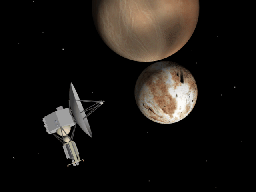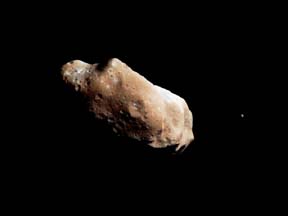Pluto Reclaims Title as Ninth Planet
On February 11th, Pluto will pass beyond Neptune and become the farthest planet in the solar system. Scientists estimate that the two planets will cross orbits at approximately 5:08 p.m. EST. Pluto has an unusual orbit which takes it closer to the Sun than Neptune for 20 years out of its 248-year orbit. Pluto has been the eighth planet since February 7th, 1979.What's New on the Site?
When Nature Strikes - Earthquakes
When Nature Strikes - Volcanoes
When Nature Strikes: Tsunami Classroom Activity
When Nature Strikes: Wildfires - Why are they a challenge to stop?
Windows to the Universe Community | |
News | Opportunities |
You might also be interested in:

Traveling Nitrogen Classroom Activity Kit
Check out our online store - minerals, fossils, books, activities, jewelry, and household items!...more
Pluto
Pluto is a frigid ball of ice and rock that orbits far from the Sun on the frozen fringes of our Solar System. Considered a planet, though a rather odd one, from its discovery in 1930 until 2006, it was...more
1999--A Year in Review...
It was another exciting and frustrating year for the space science program. It seemed that every step forward led to one backwards. Either way, NASA led the way to a great century of discovery. Unfortunately,...more
STS-95 Launch: "Let the wings of Discovery lift us on to the future."
The Space Shuttle Discovery lifted off from Kennedy Space Center on October 29th at 2:19 p.m. EST. The weather was great as Discovery took 8 1/2 minutes to reach orbit. This was the United States' 123rd...more
Moon Found Orbiting Asteroid
A moon was discovered orbiting the asteroid, Eugenia. This is only the second time in history that a satellite has been seen circling an asteroid. A special mirror allowed scientists to find the moon...more
U.S. is Fed Up with Russia
Will Russia ever put the service module for the International Space Station in space? NASA officials want an answer from the Russian government. The necessary service module is currently waiting to be...more
More on Recent Coronal Mass Ejection
A coronal mass ejection (CME) happened on the Sun early last month. The material that was thrown out from this explosion passed the ACE spacecraft. The SWICS instrument on ACE has produced a new and very...more
Mother Nature's Air Conditioning
J.S. Maini of the Canadian Forest Service called forests the "heart and lungs of the world." This is because forests filter air and water pollution, absorb carbon dioxide, release oxygen, and maintain...morePlease log in
Science Blogs
Real Climate: climate science from climate scientists

Windows to the Universe, a project of the National Earth Science Teachers Association, is sponsored in part is sponsored in part through grants from federal agencies (NASA and NOAA), and partnerships with affiliated organizations, including the American Geophysical Union, the Howard Hughes Medical Institute, the Earth System Information Partnership, the American Meteorological Society, the National Center for Science Education, and TERC. The American Geophysical Union and the American Geosciences Institute are Windows to the Universe Founding Partners. NESTA welcomes new Institutional Affiliates in support of our ongoing programs, as well as collaborations on new projects. Contact NESTA for more information.





